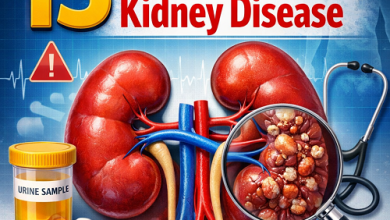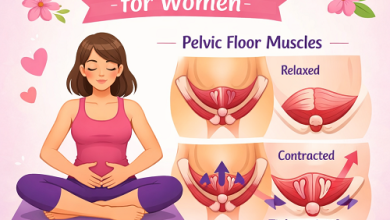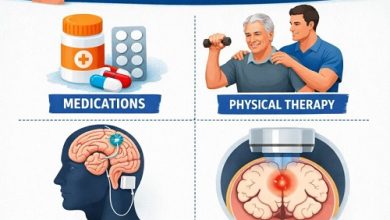Protect Your Liver Naturally: The One Thing You Should Do Every Day

Your liver is the unsung hero of your body — working tirelessly around the clock to filter toxins, metabolize nutrients, and keep your system balanced. It’s the body’s natural detox powerhouse, yet most people rarely give it the attention it deserves — until something goes wrong. From poor diet choices to environmental pollutants, your liver constantly battles harmful substances that threaten your overall health.
So what’s the one thing you should do every day to protect your liver naturally? The answer might surprise you: support your liver through daily hydration and a nutrient-rich diet rich in antioxidants and fiber.
This isn’t just about drinking more water — it’s about consistently nourishing your liver with the right habits and foods that optimize its ability to cleanse and regenerate. How to protect your liver naturally, why hydration and diet matter most, and practical steps you can start doing today to keep your liver healthy for life.
Why the Liver Is So Vital to Your Health
Before diving into daily habits, it’s important to understand what your liver does and why it deserves daily care.
The liver is your body’s largest internal organ, performing over 500 essential functions, including:
- Detoxification: Filtering toxins from the blood, including alcohol, drugs, and environmental chemicals.
- Metabolism: Breaking down fats, proteins, and carbohydrates for energy.
- Storage: Storing vitamins, minerals, and glycogen (energy reserves).
- Bile Production: Helping digest fats and absorb fat-soluble vitamins (A, D, E, and K).
- Immune Defense: Acting as a first line of defense against pathogens from the gut.
When your liver becomes overworked — due to unhealthy diet, alcohol use, or exposure to toxins — it struggles to perform these vital tasks efficiently. Over time, this can lead to inflammation, fatty liver disease, or even liver failure.
That’s why incorporating one powerful daily habit — supporting liver detoxification naturally — can make all the difference.
The One Thing You Should Do Every Day: Support Your Liver with Hydration and Whole Foods
If you could do just one thing daily to protect your liver, it would be this: stay properly hydrated and eat a diet abundant in liver-friendly foods.
These two actions work hand-in-hand. Water helps flush toxins from your body, while nutrient-dense foods supply antioxidants, fiber, and essential compounds that reduce liver stress and promote healing.
Let’s explore how these simple habits have a massive impact.
1. Hydration: The Simplest Way to Detox Naturally
Your liver needs water — and plenty of it — to function efficiently. Without enough hydration, toxins and metabolic waste can build up in your system, making the liver work harder to eliminate them.
Water helps your liver by:
- Aiding toxin removal: The liver converts harmful substances into water-soluble compounds that are excreted through urine. Without enough water, these toxins can linger longer in your body.
- Supporting digestion and bile flow: Hydration keeps bile fluid and helps your liver digest fats properly.
- Preventing fatty buildup: Chronic dehydration can lead to sluggish metabolism, increasing the risk of fatty liver disease.
How much should you drink?
Experts recommend at least 8–10 glasses (2–2.5 liters) of water daily. But your needs depend on your activity level, environment, and diet. Herbal teas, infused water, and fruits like cucumber or watermelon can also contribute to hydration.
Hydration tip: Start every morning with a glass of warm water with lemon. It helps kickstart digestion, stimulates bile production, and hydrates your system after hours of sleep.
2. Eat Liver-Loving Foods Daily
What you eat directly affects your liver’s health. Every bite you take either nourishes your liver or burdens it.
Here are the top liver-protective foods you should include every day:
a. Leafy Greens
Spinach, kale, and arugula contain chlorophyll, which helps detoxify heavy metals and neutralize chemicals. They also support the production of glutathione, a powerful antioxidant that protects liver cells.
b. Cruciferous Vegetables
Broccoli, Brussels sprouts, and cauliflower boost liver detox enzymes, helping eliminate toxins efficiently. A 2016 study published in The Journal of Nutrition found that broccoli consumption reduced liver fat buildup in lab models.
c. Garlic and Onions
Both are rich in sulfur compounds that activate liver enzymes responsible for flushing out toxins. Garlic also boosts glutathione levels — essential for detoxification.
d. Citrus Fruits
Lemons, oranges, and grapefruits are loaded with vitamin C and antioxidants that stimulate liver cleansing processes. Grapefruit, in particular, contains naringenin, which helps reduce inflammation in the liver.
e. Turmeric
Curcumin, the active compound in turmeric, is one of the most potent anti-inflammatory substances. It helps protect the liver from damage, supports bile production, and may reverse fatty liver disease in some cases.
f. Beets and Carrots
These colorful roots are high in plant flavonoids and beta-carotene, which improve overall liver function and repair oxidative damage.
g. Green Tea
Green tea contains catechins — antioxidants that enhance liver enzyme activity and protect against fat accumulation.
h. Fiber-Rich Foods
Oats, apples, lentils, and chia seeds help bind toxins in the digestive tract, preventing them from reaching the liver.
By combining these foods with daily hydration, you create a natural liver detox system that works seamlessly with your body.
Habits That Harm the Liver (and How to Avoid Them)
While you focus on protecting your liver, it’s equally important to avoid habits that damage it. Here are the top offenders — and how to reverse their effects.
1. Excessive Alcohol Consumption
Alcohol is the leading cause of liver inflammation and cirrhosis. Even moderate drinking can strain the liver if done regularly.
Tip: Aim for alcohol-free days throughout the week and replace alcoholic drinks with sparkling water infused with lemon or mint.
2. Overeating Processed Foods
Processed foods high in refined sugar, trans fats, and additives increase fat accumulation in the liver.
Tip: Choose whole foods and cook with olive oil, avocado oil, or coconut oil instead of refined vegetable oils.
3. Sedentary Lifestyle
Lack of movement leads to insulin resistance and fat buildup in the liver.
Tip: Aim for 30 minutes of moderate physical activity daily — walking, yoga, or cycling.
4. Overuse of Medications
Painkillers like acetaminophen (Tylenol) are notorious for liver toxicity when overused.
Tip: Always follow dosage instructions and consult your doctor before combining medications.
5. Environmental Toxins
Your liver filters not only dietary toxins but also those from air pollution, pesticides, and household products.
Tip: Use natural cleaning agents, avoid plastic containers with BPA, and opt for organic produce when possible.
The Science Behind Daily Liver Protection
Research continues to show that lifestyle choices play a bigger role in liver health than genetics alone. Studies reveal that hydration, plant-based diets, and regular exercise significantly reduce the risk of fatty liver disease, cirrhosis, and even liver cancer.
For instance:
- A 2021 study in Nutrients found that individuals who consumed at least five servings of fruits and vegetables daily had markedly lower liver enzyme levels, indicating reduced inflammation.
- Another study published in The Journal of Hepatology showed that people who drink 3–4 cups of coffee or green tea daily have a lower risk of liver fibrosis and cancer.
- Regular hydration also improves blood viscosity, helping the liver filter more efficiently and maintain metabolic balance.
These findings confirm one simple truth: small, consistent daily habits have the power to protect and even regenerate liver tissue.
Simple Daily Routine for Liver Protection
Here’s how you can build a simple, liver-friendly daily routine that supports detoxification and long-term health.
Morning
- Drink a glass of warm water with lemon.
- Eat a fiber-rich breakfast such as oatmeal with chia seeds and blueberries.
- Take a few minutes to stretch or practice light yoga.
Afternoon
- Stay hydrated with plain or infused water (cucumber, mint, or lemon slices).
- Eat a balanced meal of lean protein, steamed broccoli, and quinoa.
- Avoid sugary drinks or processed snacks.
Evening
- Have a cup of green tea or herbal tea (like milk thistle or dandelion root).
- Eat a light dinner rich in vegetables and healthy fats (like avocado or olive oil).
- Limit alcohol and avoid late-night heavy meals.
Before Bed
- Stay hydrated with a small glass of water.
- Practice deep breathing or meditation to reduce stress, which also benefits liver function.
Natural Supplements That Support Liver Health
While food should be your main source of nutrients, certain natural supplements can offer added liver protection when used responsibly.
- Milk Thistle (Silymarin): Known for its antioxidant and anti-inflammatory properties, milk thistle helps regenerate damaged liver cells.
- Turmeric (Curcumin Extract): Reduces liver inflammation and oxidative stress.
- Dandelion Root: Supports bile flow and natural detoxification.
- N-Acetyl Cysteine (NAC): Boosts glutathione production — the liver’s most powerful antioxidant.
- Artichoke Leaf Extract: Aids in digestion and protects liver cells from toxins.
Always consult your healthcare provider before starting any supplement regimen, especially if you’re taking medications or have liver conditions.
Signs Your Liver Needs Help
Your liver often gives subtle signs before serious issues arise. Pay attention to symptoms like:
- Chronic fatigue
- Unexplained weight gain or bloating
- Yellowing of eyes or skin (jaundice)
- Brain fog or difficulty concentrating
- Poor digestion or loss of appetite
- Dark urine or pale stool
If you notice persistent symptoms, consult a healthcare professional for liver function tests. Early detection can prevent irreversible damage.
The Long-Term Benefits of Daily Liver Care
By adopting one daily habit — hydrating properly and eating a liver-supportive diet — you’re not only protecting your liver but also improving your entire body’s well-being.
Long-term benefits include:
- Increased energy and reduced fatigue
- Better digestion and nutrient absorption
- Clearer skin and balanced hormones
- Stronger immune system
- Reduced risk of fatty liver disease and cirrhosis
When your liver functions optimally, your whole body thrives.
Final Thoughts
Protecting your liver doesn’t require expensive detox products or drastic diets. The most effective strategy is beautifully simple: hydrate consistently and nourish your body with whole, antioxidant-rich foods every single day.
This daily ritual gives your liver the tools it needs to cleanse naturally, regenerate efficiently, and keep your entire body balanced.
Remember — your liver never stops working for you. So do one good thing for it every day — drink water, eat fresh foods, and treat it with care. Over time, this small act will make a world of difference in your health, vitality, and longevity.




